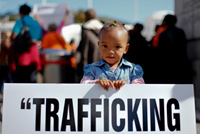Source: United Nations Human Rights
Businesses may unknowingly be associated with the crime of human trafficking when their suppliers, subcontractors, or partners supply materials or products that have been produced by trafficked persons. “In today’s globalized world, the risks of human trafficking in supply chains are significant throughout economic sectors and affect all States,” says Joy Ngozi Ezeilo, UN Special Rapporteur on trafficking in persons, in her report to the 67th session of the UN General Assembly.
 Globalization has made supply chains considerably complex, involving multiple suppliers in various locations around the world. In this environment, monitoring of the supply chain has inevitably become challenging.
Globalization has made supply chains considerably complex, involving multiple suppliers in various locations around the world. In this environment, monitoring of the supply chain has inevitably become challenging.
The use of trafficked persons can be seen across the supply chain in various sectors. The economic sectors mostly connected to human trafficking include agriculture and horticulture, construction, garments and textiles, hospitality and catering, mining, logging and forestry, food processing and packaging, transportation, and domestic services. For example, global clothing companies have been accused of exploiting migrant workers in Asia, while chocolate and confectionary companies have been reported employing children who have been trafficked for forced labour under deplorable conditions in cocoa farms in West Africa.
On one occasion, an international tobacco company was linked to trafficking and forced labour through the tobacco farm owners who supply tobacco to the company’s subsidiary in Central Asia. Ezeilo observed that ”while the international company had no direct contractual relationship with the tobacco farm owners, it has nevertheless found it difficult to disassociate itself from the allegations in the light of the significant economic benefits that it ultimately derives from such conduct”.
Ezeilo says that States have an obligation under international human rights law to protect everyone within their jurisdiction against human rights abuses.
While states have in fact taken anti-trafficking measures, these are often not enforced. Ezeilo stresses the importance of effectively enforcing such measures, as well as other related national laws, such as labour and immigration laws, which are equally crucial in eliminating the risks of trafficking in persons in supply chains.
In her report, she notes the value of creative laws and mechanisms directed at businesses to better monitor their conduct, such as national certification or labelling systems, public listing of corporations known to have used slave labour, and laws requiring disclosure of information on corporate efforts to prevent human trafficking.
Businesses also have responsibilities to respect human rights and they are uniquely positioned to prevent or mitigate any risks of trafficking in their supply chains.
“Businesses cannot, and should not, shy away from the issue of human trafficking, not only because it amounts to human rights violations and is a criminal offence in most States, but also because it creates reputational and financial risks to their operations,” says Ezeilo.
Ezeilo recommends that all global businesses commit themselves to the UN Guiding Principles on Business and Human Rights and become signatories to the UN Global Compact. Ezeilo also urges businesses to exercise due diligence and conduct a risk assessment for their entire production chain in order to eliminate risks of human trafficking in their operations.
29 January 2013elated articles





No comments:
Post a Comment